Uzbek president meets SCO head
Talks focus on further expanding regional cooperation

Zhang Ming (first right), Secretary General of the Shanghai Cooperation Organization, meets with Shavkat Mirziyoyev (second left), President of the Republic of Uzbekistan during his visit to Uzbekistan from May 13 to 16, 2022. Photo: Courtesy of the Uzbek Embassy in China
The President of the Republic of Uzbekistan Shavkat Mirziyoyev received Secretary General of the Shanghai Cooperation Organization (SCO) Zhang Ming, who visited Uzbekistan.The two sides discussed the issues of further expanding practical cooperation and strengthening regional partnership within the SCO, as well as the preparation of major events during Uzbekistan's presidency at the Organization.
It was noted with satisfaction the successful completion of half of the meetings and sessions planned for 2022. The active work is underway to concur on the documents of the forthcoming SCO summit in Samarkand.
The need to reinforce the Organization's potential in countering new challenges and threats to stability and security, to intensify multilateral cooperation based on the principles of the "Shanghai Spirit" was underlined.
"Because of the COVID-19 pandemic and Western sanctions against Russia, all member states are facing difficulties with inflation, energy, consumption, and food security, so it is more urgent to actively carry out economic cooperation under this organization,"Zhao Huirong, associate research fellow at the Institute of Russian, Eastern European and Central Asian Studies under the Chinese Academy of Social Sciences (CASS), told the Global Times on Wednesday.
A particular attention is paid to promoting the joint interconnectivity projects in the area of transport, green energy, innovation, digital economy and industrial cooperation.
It is generally agreed that the active cultural and tourist exchanges should be resumed in the post-pandemic period.
According to the most recent date from the Xinhua News Agency, in 2020, the combined economic aggregate of the SCO countries reached $18.4 trillion, an 11-fold increase since its founding, while intra-SCO trade jumped eight times to $6.2 trillion over the same period.
People-to-people exchanges have also maintained strong momentum. Back in 2019, before the COVID-19 pandemic, the number of visits between China and other SCO members exceeded 7 million, 3.5 times as many as in 2001, Xinhua said.
The meeting has also touched on current issues on the international agenda. The need to play a better role of the SCO in the Afghan issue and actively involve Afghanistan in regional infrastructure development programs was outlined.
"Uzbekistan is an important country in Central Asia in terms of economic aggregate and development level, and its social stability," Wu Hongwei, director at the Institute of Russian, Eastern European and Central Asian Studies under the CASS, told the Global Times on Wednesday.
"Moreover, it also shares border with Afghanistan and plays an active role in the reconstruction assistance to Afghanistan," he added.
During his stay in Tashkent, Zhang Ming held talks with Acting Minister of Foreign Affairs of the Republic of Uzbekistan Vladimir Norov. He also visited the Executive Committee (headquarters) of the SCO Regional Anti-Terrorist Structure and met with the Director Ruslan Mirzayev. The possibilities of further intensification of coordination and interaction between the two permanent SCO bodies - the Secretariat and the RATS were discussed.
"The SCO has always played a significant role in security issues such as counter-terrorism and anti-extremism in Central Asia," Wu said. "In particular, the member states are under considerable pressure from the West in the face of the Russia-Ukraine crisis. Therefore, it is even more necessary for the member states to actively cooperate with this platform."
